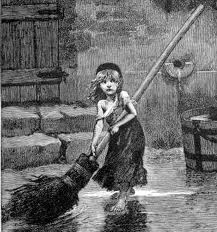
Victor Hugo is known to most people as the author of two great novels of the Romantic era – Les Miserable’s and The Hunchback of Notre Dame. But over 83 years of life he came to embody all of France in his passions and impact. Eliminating all people named Napoleon he was probably the greatest celebrity in 19th Century France.
Victor Hugo was born in 1802 in Eastern France. He was literally born into controversy – his father was an atheist officer in Napoleon’s army, his mother a devout Catholic royalist. What it got for Victor was a lot of travel and an ultimate settling in Paris with his mother. It was in Paris that Victor Hugo would remain for much of his life.
 |
| Statue of Victor Hugo in Guernsey England where he spent his exile |
From early in life Victor Hugo showed himself to be an unusually gifted writer, publishing his first collection of poems at age 20, a collection that would receive royal accolades. In his mid-twenties he began to write fiction. His first full length novel was The Hunchback of Notre Dame, published when he was 29. The book was an immediate international hit and led to the restoration of Notre Dame Cathedral, which had fallen into great disrepair. The Hunchback of Notre Dame also established Hugo as a spokesman for the underclass, a precursor of Charles Dickens in Victorian England. It has been made into movies of all shapes and sizes. Check out the trailers for the 1939 Charles Laughton classic and the 1996 Disney animated version to see how Hollywood has employed Hugo's tragedy for profit.
 |
| Cosette from original illustration for Les Miserable's. Check out this two part '20/20' feature on the original Broadway Opening of Les Miz, Part One and Part Two |
Following the completion of this work Victor Hugo turned his attention to what he felt would be a magnum opus. It took him seventeen years, but in 1862 Les Miserable’s, a sweeping story of social injustice and redemption, was published and immediately became an international sensation. To underscore how sweeping the effect of Les Miserable’s was, within a year it had been translated into English and Robert E. Lee had the novel given to all his senior officers in his army as an inspiration for the Confederate cause. Les Miserable’s has been universally recognized as a literary classic and has been translated into movies, plays and the world-renowned Broadway musical. Hugo published other novels throughout his life, as well as poetry, plays and other works. He also dabbled in visual art, with sufficient gifting that the great romantic painter Delacroix said that had he devoted himself to painting he could have been one of the greats of the century.
Victor Hugo’s public life was as extraordinary as his literary life. Though initially espousing the royalist Catholic sympathies of his mother, he gradually moved toward full embrace of Republicanism in post Napoleonic France and toward the atheistic rationalism (with a strain of spiritism) that swept through France in the 19th Century. A figure of enduring national prominence, Victor Hugo factored into all of the great political events in France in the century. Napoleon III’s imposition of the Third Empire in 1851 was publically denounced by Hugo, which led to his exile from France to England for nineteen years. With the fall of Napoleon III and the rebirth of the Republic, Victor Hugo returned to Paris a national hero and was elected to the National Assembly, where he played a short but largely symbolic role. He remained in Paris during the siege of 1870, rallying the desperate people in the beleaguered city by his sacrificial example.
 |
| A drawing by Victor Hugo |
It probably speaks to Victor Hugo’s skepticism about the various political systems that swept through France in the turbulent years of his life when he commented,
 |
| Victor Hugo's funeral procession in Paris |
I don't mind what Congress does, as long as they don't do it in the streets and frighten the horses.
Victor Hugo spent his latter years in the role of statesman and national celebrity. He died in May 1885 at the age of 83. His last recorded words were ominous, considering his atheistic perspective: This is the fight of day and night. I see black light.
His funeral procession drew two million mourners to the streets of Paris. He was buried in the Pantheon, France’s version of Westminster Abbey. He is in a room with future two future blogees on this site, Emile Zola and Alexandre Dumas.
 |
| Victor Hugo's simple tomb in the Pantheon |
 |
| The catacombs underneath the Pantheon in Paris |
I visited the Pantheon when my wife Jill and I were in Paris for our 25th Anniversary. I actually didn’t know what it was, just this big building at the end of the street. We walked up to check it out. Jill wanted to take a rest so I walked in, and found out that there were all these famous French people buried in the basement. It took a while to find a way down, but when I got there it turns out there were all these catacombs (actually pretty nicely preserved) with caskets, statues and plaques throughout. I don’t have a picture of myself in front of any of them because you couldn’t actually get into the rooms. But it was pretty surreal down there, definitely worth wandering around.
Other notables who are that I've blogged on include Alexandre Dumas and Jean-Jacques Rousseau
Other notables who are that I've blogged on include Alexandre Dumas and Jean-Jacques Rousseau
 |
| Your blogger on the steps of the Pantheon |
Other blog subjects buried at the Pantheon:
Rousseau
Good article.... May I share an Interview with Victor Hugo (imaginary) in https://stenote.blogspot.com/2018/07/an-interview-with-victor.html
ReplyDelete